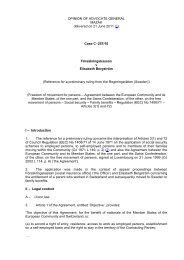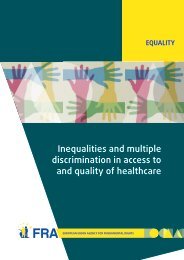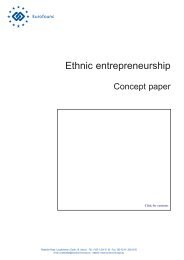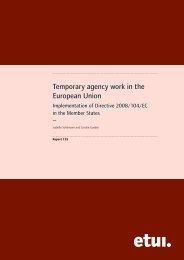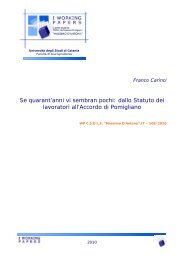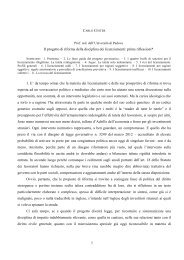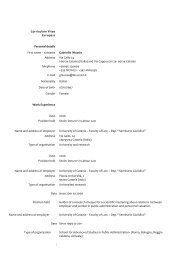Study on non-legislative initiatives for companies to promote gender ...
Study on non-legislative initiatives for companies to promote gender ...
Study on non-legislative initiatives for companies to promote gender ...
Create successful ePaper yourself
Turn your PDF publications into a flip-book with our unique Google optimized e-Paper software.
134 Gender equality <strong>initiatives</strong><br />
An important criteri<strong>on</strong> when assessing a measure is its sustainable and l<strong>on</strong>g-term<br />
effect with a view <strong>to</strong> realising <strong>gender</strong> equality principles in the participating <strong>companies</strong>.<br />
In our c<strong>on</strong>text, the questi<strong>on</strong> is whether a certain type of n<strong>on</strong>-<strong>legislative</strong> initiative<br />
<strong>promote</strong>s <strong>gender</strong> equality in a more sustainable way than others do. Labels and<br />
charters seem <strong>to</strong> emphasise the enterprise’s future management practice and reflect an<br />
organisati<strong>on</strong>al change <strong>to</strong>wards the promoti<strong>on</strong> of <strong>gender</strong> equality. Moreover, the signing<br />
of a charter aims not <strong>on</strong>ly at proclaiming the enterprise’s principles but also at<br />
motivating others <strong>to</strong> follow. In the case of a label, the limited time period of granting the<br />
label and the requirements of a re-labelling - which entail a further improvement of the<br />
<strong>gender</strong> equality - fosters sustainable change. A prize and rankings basically assess the<br />
status quo of an enterprise’s <strong>gender</strong> equality per<strong>for</strong>mance. Nevertheless, within the<br />
awarding process the existence of a sustainable <strong>gender</strong> equality policy (e. g. the<br />
existence of <strong>gender</strong> equality plans) may still c<strong>on</strong>stitute an important assessment<br />
criteri<strong>on</strong>. And worst ranked enterprises could be driven <strong>to</strong> change their practices <strong>to</strong><br />
avoid repeated negative publicity.<br />
Each type of initiative has its advantages and disadvantages and can be seen as an<br />
appropriate measure <strong>for</strong> different situati<strong>on</strong>s.<br />
Labels can initiate a sustainable organisati<strong>on</strong>al change and c<strong>on</strong>tinuous improvement of<br />
the enterprise’s <strong>gender</strong> equality policy. The assessment process includes clear requirements<br />
and an external evaluati<strong>on</strong>. Based <strong>on</strong> the analysis of the status quo development<br />
plans are <strong>for</strong>mulated with the help of external c<strong>on</strong>sultants. Thus, sustainable organisati<strong>on</strong>al<br />
change is fostered. In c<strong>on</strong>trast, such external c<strong>on</strong>sultancy often entails costs and<br />
could be rather time c<strong>on</strong>suming. As the labelling is c<strong>on</strong>stituted as a process such an<br />
initiative seems <strong>to</strong> be appropriate <strong>for</strong> enterprises willing <strong>to</strong> change its organisati<strong>on</strong>al<br />
structure and implement a sustainable <strong>gender</strong> equality policy throughout the whole<br />
organisati<strong>on</strong>.<br />
Prizes or awards have the advantage of a wide media echo, <strong>for</strong> the enterprises as well<br />
as <strong>for</strong> the promoti<strong>on</strong> of <strong>gender</strong> equality in general. As it is based <strong>on</strong> the analysis of the<br />
status quo it is an instrument <strong>to</strong> recognize the ef<strong>for</strong>ts an enterprise has already made<br />
rather than initiating further developments. Thus, it seems <strong>to</strong> be an appropriate<br />
additi<strong>on</strong>al instrument <strong>to</strong> highlight those enterprises which are active in other <strong>initiatives</strong><br />
(e. g. prize <strong>for</strong> labelled enterprises), <strong>to</strong>o. Furthermore, prizes seem <strong>to</strong> be a good “starter<br />
drug” <strong>for</strong> enterprises that have started <strong>to</strong> implement <strong>gender</strong> equality measures but have<br />
not yet publicised their ef<strong>for</strong>ts or underg<strong>on</strong>e an external evaluati<strong>on</strong>. The enterprise does<br />
not risk much when participating.<br />
The signing of a charter can be interpreted as a missi<strong>on</strong>ary act. It represents a str<strong>on</strong>g<br />
commitment of the enterprise <strong>to</strong> act in line with the charter’s principles which become<br />
part of the missi<strong>on</strong> statement and include implicitly the wish <strong>to</strong> motivate others <strong>to</strong> follow.<br />
It is an ideal instrument <strong>for</strong> enterprises which have already started <strong>to</strong> support <strong>gender</strong><br />
equality and want <strong>to</strong> <strong>promote</strong> their activities. As it requires much self-initiative and<br />
includes the commitment that enterprises implement the charter’s principles in c<strong>on</strong>crete<br />
measures tailored <strong>to</strong> the specific situati<strong>on</strong> it can be seen as a hybrid between n<strong>on</strong><strong>legislative</strong><br />
<strong>initiatives</strong> and <strong>initiatives</strong> individually taken by <strong>companies</strong>. This stress <strong>to</strong> selfinitiative<br />
entails the danger that the charter is seen as a public relati<strong>on</strong>s measure <strong>to</strong><br />
positi<strong>on</strong> the enterprise as a socially resp<strong>on</strong>sible <strong>on</strong>e without c<strong>on</strong>crete measure <strong>to</strong><br />
follow.<br />
Rankings have the advantage that they are ideally based <strong>on</strong> “hard facts” and<br />
quantitative data which is assessed by external experts. This guarantees neutrality but





